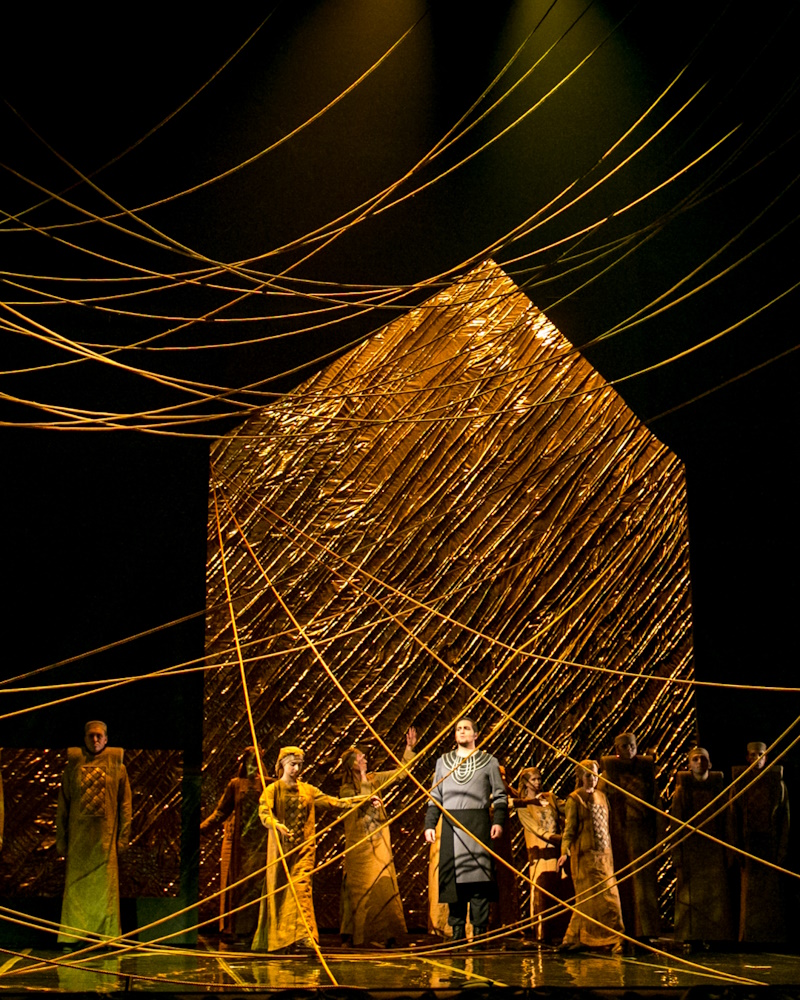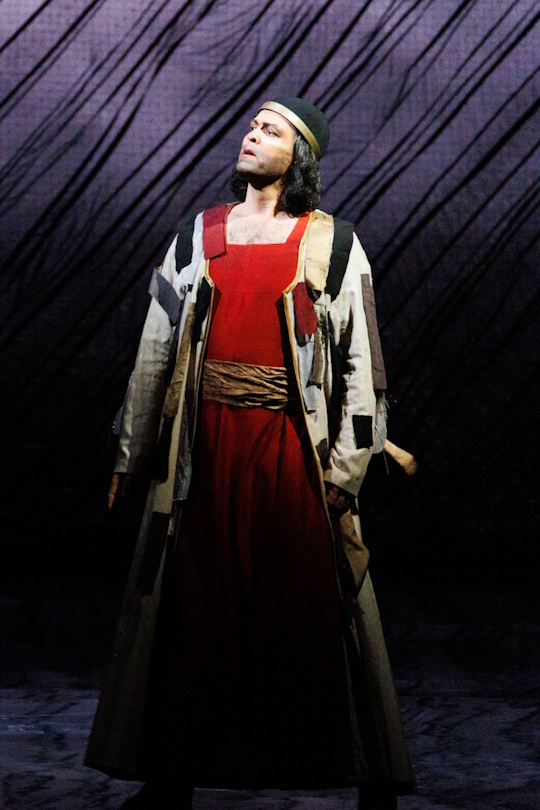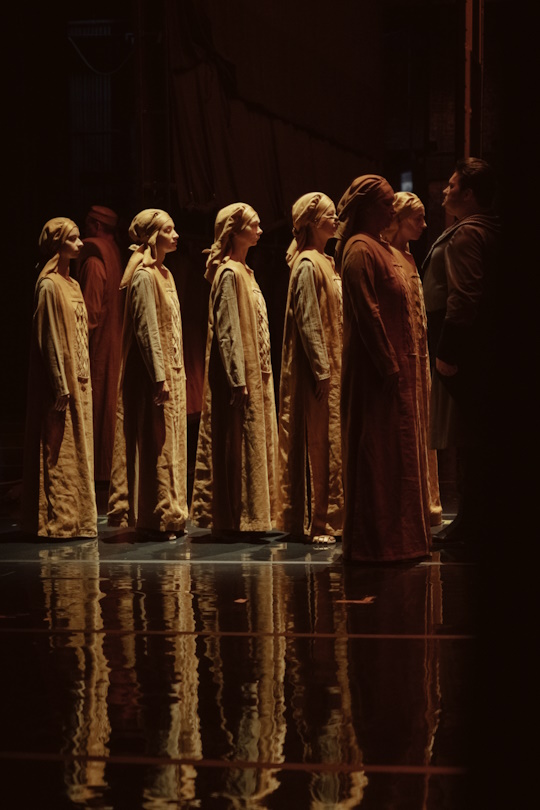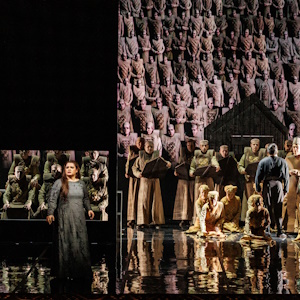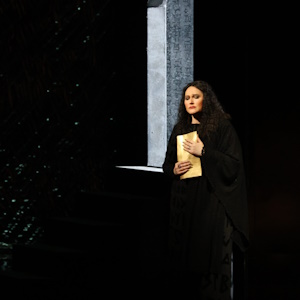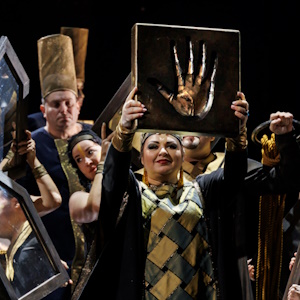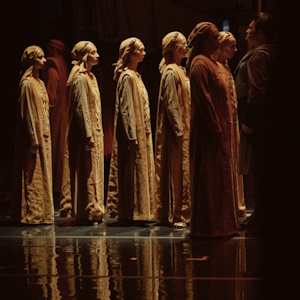
Aida
opera in three acts
music by Giuseppe Verdi
 performed in Italian (with Russian surtitles)
performed in Italian (with Russian surtitles)
Cast
Slaves, commanders, and kings — all are equal in the face of love, jealousy, a longing for home, or a thirst for victory. Aida crystallizes vast musical riches and white-hot passions. Written for a theatre in Cairo to celebrate the opening of the Suez Canal, this opera, based on a story from the time of the pharaohs, is recognized as an unqualified masterpiece. The Mikhailovsky Theatre’s production defers to Verdi’s original score. The stage setting, metaphorical and elegant, highlights the principal characters’ profound emotions and serves as an exquisite background for the music of a genius.
Act one
The high priest Ramfis tells the chief guard Radamès that the Ethio-pian army is preparing another attack against Egypt. The goddess Isis has already chosen the Egyptian commander, but his name is kept in secret. Radamès hopes that he is to command the Egyptian army. He is in love with Aida, an Ethiopian girl enslaved by the Egyptians, and he believes that victory in the war would enable him to free her.
Princess Amneris, the king’s daughter, loves Radamès, and when the three meet, she jealously senses his feelings for Aida.
A messenger tells the King of Egypt that the Ethiopians are advanc-ing. The king names Radamès to lead the army, and all join in a patriotic anthem. Left alone, Aida is torn between her love for Radamès and loyalty to her native country, where her father, Amonasro, is king. She prays to the gods for mercy.
The priests consecrate Radamès to the service of the god. Ramfis orders him to protect the homeland.
Act two
Amneris waits for the triumphant return of Radamès. By falsely tell-ing Aida that Radamès has died in the battle, she tricks her into pro-fessing her love for him. The king and Amneris observe the celebrations and crown Radamès with a victor’s wreath. Captured Ethiopians are led in. Among them is Amonasro, Aida’s father, who signals his daughter not to reveal his identity as king. Radamès asks the king to set the prisoners free. The king grants his request but keeps Amonasro and Aida in custo-dy. The king declares that as a victor’s reward, Radamès will have Amneris’s hand in marriage.
Act three
On the eve of her marriage with the victorious warrior, Amneris is taken by Ramfis to pray in the temple of Isis on the bank of the Nile. Nearby, Aida is waiting for Radamès. Amonasro suddenly ap-pears. Invoking Aida’s sense of duty, he makes her agree to find out from Radamès which route the Egyptian army will take to invade Ethiopia. Amonasro hides as Radamès arrives. He assures Aida of his love and agrees to run away with her. Aida asks him about his army’s route, and just as he reveals the secret, Amonasro emerges from his hiding place. When he realizes that Amonasro is the Ethiopian king, Radamès is horrified by what he has done. Ramfis and Amneris step out of the temple. Father and daughter are able to escape, but Radamès surrenders to the priests.
Act four
Radamès awaits trial as a traitor, believing Aida to be dead. Am-neris tells him that Aida has survived and offers to save him if he renounces Aida, but Radamès does not want to live without her. When he is brought before the priests, he refuses to answer their ac-cusations and is condemned to be buried alive.
Radamès has been taken into the lower floor of the temple and sealed up in a dark vault, where he thinks that he is alone. As he hopes that his beloved is in a safer place, he sees Aida, who has hid-den here to share his fate. Priestesses and priests solemnly sing in the temple above. Aida and Radamès express their love for the last time while Amneris prays for Radamès’s soul.
Premiere of the production: 25 November 2019
Libretto by Antonio Ghislanzoni
after the scenario by François Auguste Ferdinand Mariette
- Musical Director of the productionAlexander Vedernikov
- Stage DirectorIgor Ushakov
- Stage Designer, Lighting DesignerMarius Nekrošius
- Costume DesignerNadezhda Gultyaeva
- VideocontentVadim Dulenko
- ChoreographerMaria Bolshakova
- Chorus MastersAlexey Dmitriev, Sergey Tsyplenkov
- Principal PianistNatalia Dudik
- Assistant to Stage DirectorYulia Prokhorova
- Assistant to Musical DirectorAndrey Petrenko


